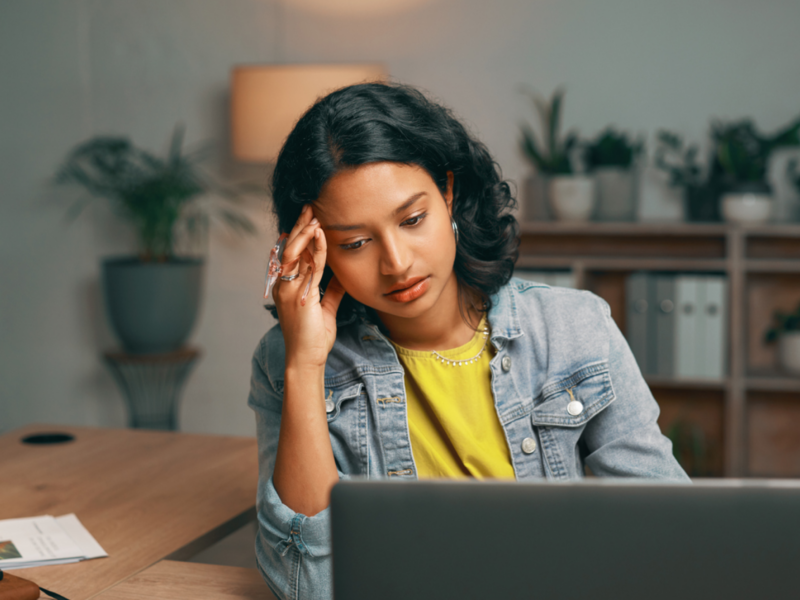
Table of Contents
Here’s How Alcohol Affects Anxiety
Written By: Charlie Health Editorial Team

Clinically Reviewed By: Dr. Don Gasparini
December 18, 2023
6 min.
Many people turn to alcohol as a way to cope with anxiety. Using alcohol as a coping mechanism for anxiety, however, may exacerbate anxiety symptoms.
Learn more about our Clinical Review Process
Table of Contents
The relationship between alcohol and anxiety is complex. Initially, consuming alcohol may provide a fleeting feeling of relaxation or ease, seemingly reducing inhibitions and social anxieties. It can, however, eventually exacerbate anxiety symptoms. Below, we delve into the link between alcohol use and anxiety and how to manage both conditions if they start to take a toll on your mental health.

Personalized anxiety treatment from home
Get help with co-occurring anxiety disorders and substance use.
What are the effects of alcohol on anxiety?
As mentioned, alcohol provides initial relief from the symptoms of anxiety due to alcohol’s effect on the brain’s neurotransmitters. Specifically, alcohol causes an increase in gamma-aminobutyric acid (GABA) activity, which typically has calming effects. Alcohol also has a sedative effect, which may dull peoples’ emotional responses and temporarily numb them from distressing feelings. However, this initial relief is short-lived, and the rebound effects can be detrimental to anxiety.
As the body metabolizes alcohol, it disrupts the delicate balance of neurotransmitters in the brain, causing a subsequent increase in excitatory neurotransmitters like glutamate and an eventual decrease in GABA. As a result, once the initial calming effects wear off, the brain may become hyperactive, causing feelings of anxiety or restlessness. Essentially, alcohol can intensify feelings of anxiety and agitation post-consumption.
Also, alcohol’s impact on sleep quality contributes significantly to heightened anxiety levels. While alcohol might help some people fall asleep faster, it disrupts the sleep cycle, reducing the amount of restorative REM sleep and causing frequent awakenings throughout the night. Poor sleep quality contributes to increased feelings of irritability, fatigue, and physical discomfort, all of which can exacerbate anxiety the following day.
Dehydration is another physical consequence of alcohol consumption that can intensify anxiety symptoms. Alcohol is a diuretic, leading to increased urination and subsequent dehydration. Dehydration can manifest in headaches, dry mouth, and overall physical discomfort, all of which can contribute to feelings of unease and anxiety.
All of the aforementioned factors (poor sleep, dehydration, physical discomfort) can intensify anxiety during a hangover, a phenomenon known colloquially as “hangxiety” (a blend of “hangover” and “anxiety”). Hangxiety can be a distressing experience, contributing to a cycle of increased anxiety following alcohol consumption.
What exactly is hangxiety?
As mentioned, hangxiety refers to the feelings of anxiety or heightened levels of unease and distress experienced after consuming alcohol, typically during a hangover. The day after heavy drinking, many people experience a hangover, marked by headaches, fatigue, dehydration, nausea, and sometimes anxiety. Hangxiety specifically refers to the anxiety or feelings of worry and discomfort that accompany a hangover.
While hangxiety is a common experience for some people after drinking, its severity can vary widely. Not everyone who experiences a hangover will necessarily experience hangxiety, and the intensity of hangxiety can depend on various factors such as individual tolerance to alcohol, overall mental health, amount of alcohol consumed, and other lifestyle factors.
Addressing hangxiety involves rehydration, rest, and time for the body to recover from the effects of alcohol. Engaging in healthy habits, managing stress, moderating alcohol intake, and seeking professional help from healthcare providers or mental health professionals can also help reduce the likelihood and severity of hangxiety.

How does alcohol affect your mental health?
People experiencing anxiety may turn to alcohol as a coping strategy to temporarily alleviate their symptoms or to escape from overwhelming feelings of anxiety or distress. Also, research shows people often use alcohol to self-medicate symptoms connected to mental health conditions like panic disorder, social anxiety disorder, generalized anxiety disorder, bipolar disorder, mood disorders, and more.
However, drinking alcohol as a coping mechanism for emotion regulation can potentially exacerbate underlying mental health conditions. While alcohol may offer temporary relief, it is not an effective or sustainable long-term solution for managing anxiety or mental health in general. As mentioned, the calming effects of alcohol are short-lived, and as the body metabolizes the substance, it can lead to rebound effects that intensify anxiety symptoms and take a negative toll on mental health.
The cycle of alcohol use and increased anxiety
The cycle of alcohol use and increased anxiety often forms a self-perpetuating loop that can be challenging to break (sometimes called alcohol addiction). Initially, some people may turn to alcohol as a means to alleviate feelings of anxiety, stress, social anxiety, and more. Over time, this pattern can lead to a dependence on alcohol as a means to manage anxious feelings, ultimately worsening both the anxiety symptoms and the reliance on alcohol as a coping strategy.
This cycle of alcohol misuse and increased anxiety can have far-reaching consequences on a person’s mental health and overall well-being. Continuous reliance on alcohol, binge drinking, or heavy drinking in general to manage anxiety can exacerbate underlying mental health conditions and lead to the development of alcohol use disorder.
The increased anxiety resulting from alcohol consumption can further perpetuate feelings of distress and negatively impact various aspects of life, including relationships, work performance, and overall quality of life. Breaking this cycle often requires recognizing the interconnected nature of alcohol use and anxiety and seeking alternative, healthier coping strategies to manage anxious feelings effectively.
Does anxiety increase your risk of alcohol dependency?
The relationship between anxiety and alcohol dependency is often bidirectional, meaning it goes both ways. On the one hand, research shows those with anxiety disorders may be more at risk of using alcohol, in part for symptom management. This can lead to repeated use and potentially result in alcohol tolerance, where larger amounts are needed to achieve the same calming effect. Over time, this pattern can progress to alcohol dependence or alcohol use disorder.
On the other hand, studies show that chronic alcohol use or alcohol dependence can exacerbate underlying anxiety disorders. As the body metabolizes alcohol, it can heighten feelings of anxiety or agitation. This rebound effect can lead some people to consume more alcohol to relieve the increased anxiety, including panic attacks, perpetuating a cycle of increased alcohol use and heightened anxiety.
Understanding the concept of dual diagnosis: co-occurring alcohol use disorder and anxiety
Dual diagnosis refers to the presence of two or more distinct and simultaneous disorders or conditions in an individual. In the context of mental health and substance use, it commonly refers to the co-occurrence of a substance use disorder alongside another mental health condition. People with co-occurring alcohol use disorder and anxiety, for example, experience symptoms of both conditions simultaneously.

Effective treatment for alcohol use and anxiety disorders
Treating co-occurring mental health conditions requires an integrated approach that addresses both conditions simultaneously. In the case of alcohol use disorder and anxiety, it’s important to work with a mental health professional experienced in treating both conditions (or co-occurring disorders) to develop an effective and individualized treatment plan. Below are some examples of what effective treatment for co-occurring alcohol use and anxiety disorders will include.
Integrated treatment approach
This may include a multidisciplinary team of professionals—including psychiatrists, psychologists, addiction counselors, and medical specialists— who work together to develop a comprehensive treatment plan.
Group sessions, support groups, and peer support
Participation in group sessions with peers and support groups specifically tailored for people with co-occurring disorders can provide a supportive environment, reduce feelings of isolation, and offer encouragement from peers facing similar challenges.
Behavioral therapies
Therapeutic approaches, such as cognitive behavioral therapy (CBT), dialectical behavior therapy (DBT) skills, or acceptance and commitment therapy (ACT), can be effective in treating co-occurring disorders.
Continued care and relapse prevention
After the initial treatment, ongoing support, relapse prevention strategies, and long-term follow-up are essential to sustain recovery and prevent relapse for both alcohol use disorder and anxiety disorders.
Substance use disorder & co-occurring disorder treatment at Charlie Health
If alcohol abuse or substance abuse is impacting your mental health, Charlie Health is here to help. Charlie Health’s virtual Intensive Outpatient Program (IOP) provides more than once-weekly mental health treatment for young people dealing with complex mental health conditions, including those struggling with mental health conditions like anxiety and co-occurring alcohol abuse or substance abuse. Our expert clinicians incorporate evidence-based therapies into individual counseling, family therapy, and group sessions. With treatment, managing mental illness is possible. Fill out the form below or give us a call to start healing today.
References
Alcohol Anxiety: Can Drinking Cause Anxiety & Panic Attacks?
Alcohol, Anxiety, and Depressive Disorders – PMC
Alcohol Use and Anxiety: Diagnostic and Management Issues | American Journal of Psychiatry
https://www.ncbi.nlm.nih.gov/pmc/articles/PMC3860396/




